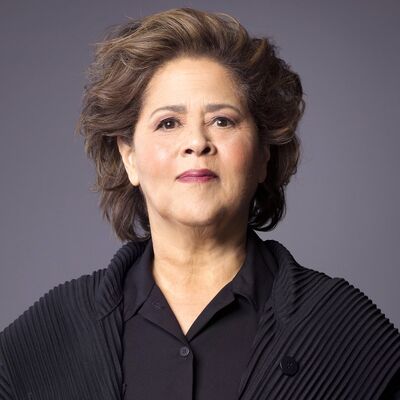
Arden Ryan
contributing writer
As a performer and a dramatist, Anna Deavere Smith has spent a career looking for expressive behavior in everyday people.
Smith has been writing and performing one-woman shows for most of her life, beginning with her longtime project, On the Road: A Search for American Character, in the early 1980s. That project took her around the country, interviewing hundreds of people and creating plays to reflect their lives and individuality, in their words.
“Anything that ends up on stage has to be more expressive than how we talk in life,” Smith said, “with the hope of also involving people emotionally.”
At 10:45 a.m. today in the Amphitheater, Smith will reflect on her body of work and share stories from her works in progress. Continuing the week’s Chautauqua Lecture Series theme, “Freedom of Expression, Imagination, and the Resilience of Democracy,” Smith will share her experiences speaking with people during challenging times and conveying their words with theater.
The bulk of her theatrical work has been spent traveling to places of traumatic social challenge and taking first-hand accounts. Two of her most renowned plays center on racism in America, and another explores healthcare, all involving interviews and compilations of real-life stories.
In the months after the Los Angeles riots of 1992, Smith conducted 320 interviews, expressing their sentiments through her play Twilight.
In 2015, she released Notes from the Field, compiling hundreds of interviews on the school-to-prison pipeline. Her most recent stage production, the play focuses on young people in the criminal justice system and “how youth try to make it through,” Smith said.
“My work is about looking for not just what people say, but how they say it,” she said. “Hopefully, I can record something that is said in a very compelling way.”
Smith described her process as “going person to person and asking them to tell me stories about things that have affected their lives,” she said, and will take the opportunity this morning to discuss what she’s learned about the beauty and elegance of human expression.
“One of the great things about coming to Chautauqua is … it’s an audience of people who want to spend time together and share ideas,” Smith said. She will share her latest projects, surrounding youth and the challenges they face, during Chautauqua’s week on democracy, and explore the factors that inhibit it.
“A healthy democracy is an educated democracy, and (one) where there’s opportunity,” Smith said, and she often investigates democracy and peace in her socially engaged plays.
“Most theater communities are always asking the question, ‘How can we be of use to our community?’ ” she said. Smith herself has long been involved in the work of creating art that engages with society, founding the Institute on the Arts and Civic Dialogue in 1997 as a community of artists across art forms to support projects to illuminate social problems in America, while inviting public engagement.
“The art was only one part of it. The other part of it was the nature of the discussion. Now, that’s not unusual at all,” Smith said, with audience interaction becoming more robust and expressive with each production.
In spring 2023, her first opera project, Proximity, was produced in Chicago and focuses on gun violence among young people in that city. Working on the project was “a very dynamic experience,” Smith said. “I still have that in my mind.”
Her current work in progress in Baltimore, Smith said, involves “interviewing some young ladies in high school” whom she worked with last year. Now, she’s crafting a new play with their words and stories.
In her lecture this morning, Smith will describe what she calls “performance as a way of knowing” and her work “using performance techniques to learn more about how these young people see the world.”
From conducting countless interviews across decades of work, Smith said she’s realized the simplest questions are often the best to get at the heart of a person’s struggles. Just asking, “what happened?” can elicit the most candid responses.
“If I have a theory at all,” she said, “it’s that if something did happen, this type of expressive and — what I would consider beautiful — language just comes forward.”




